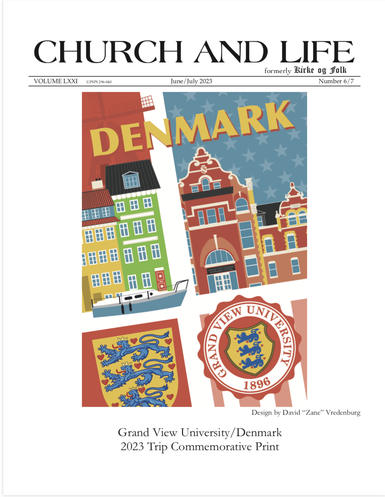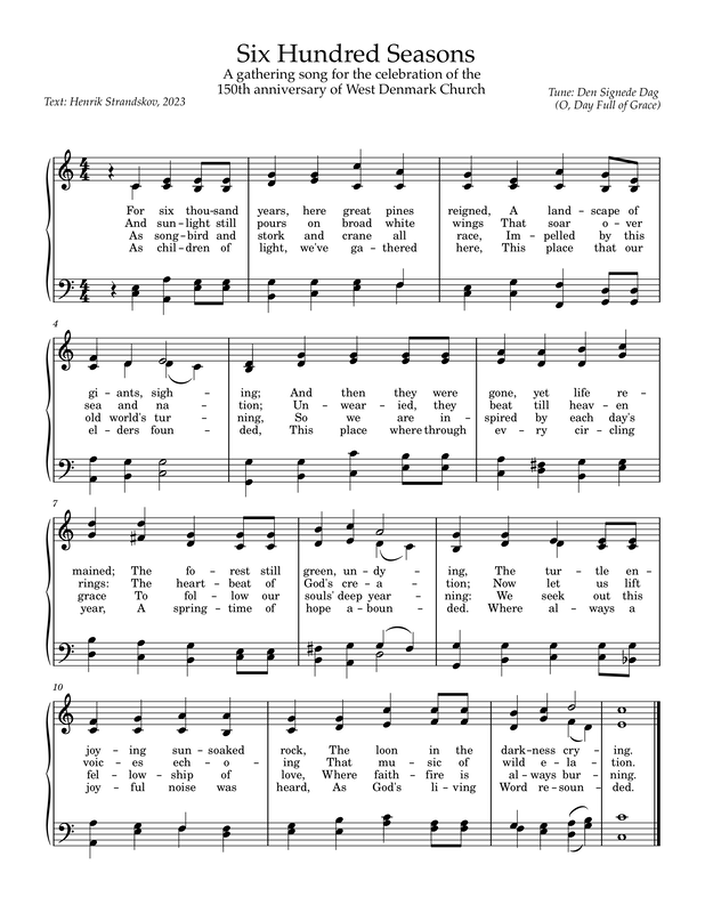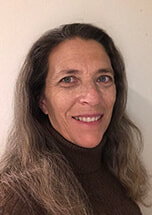|
By MEGAN EIDE
(called to serve Danebod Lutheran Church in Tyler, MN, starting August 2023) It was a game to me. When I moved to Denmark for a semester in 2018, it was my little game to see how long I could pass as Danish. I mean, I have many advantages: I have blonde hair, blue eyes, and light skin. I love rye bread and I could drink coffee every hour, every day. I also played handball. Of course, I was very bad at it, but I looked fantastic in my uniform! I biked to work, paid my taxes, knit on the train, and I was proud of all of it! Yes, my little game was all fun and hyggelig… that is, until I opened my mouth. I swear, the moment that I would say to another, “Good morning!” or “Hello!” they would say, “Woah! You are not Danish!” and boom! The game was over. I lost. So, I would just say, “Yeah, yeah, I am America . . . haha . . . rødgrød med fløde, haha!” It was in these moments that I wished I had the gift of speaking in tongues. Like the Apostles in our Bible reading from today (Acts 2:1-13, 42-47), I wished that the Holy Spirit would come to me and help me with this hard language and its impossible vowels and meaningless number system. I wanted to be in community with people from other countries, like Peter and the other disciples, and speak easily with them so we could understand each other without any problems. But unfortunately, the Holy Spirit is not under my command, so I return again and again to my grammar book and Google Translate. What does it mean, then, to have the gift of the Holy Spirit today, the Spirit of many languages and community? What does it mean, really, to speak in other tongues? To begin to answer these questions, let us look back at the Gospel of John and read about when Jesus first promised the gift of the Holy Spirit to his disciples. When he explained, “If you love me, you will keep my commandments and I will send you another advocate to be with you forever… Whoever has my commands and keeps them is the one who loves me. The one who loves me will be loved by my Father, and I too will love them and show myself to them” (John 14:15-21). The word Jesus uses the most here to describe what the Holy Spirit does is “love.” The Holy Spirit comes to us from the Lord of Love so we, his beloved children, may love each other as Jesus Christ first loved us. It is the Holy Spirit’s language: the language of love. So, when we think about what it means to speak in other tongues, let us really think about what it means to speak with love and follow Christ’s example. When we study Jesus’ life in the Gospels, we meet a man who loves with more than words. Jesus loves with all his senses. He saw the poor, sick, and marginalized. He listened to their stories, struggles, hopes, and questions. He touched their scars and wiped their tears. He ate with the outcast, the hated, and the forgotten. Jesus was the kind of person who paid attention to a lowly Samaritan woman; the kind of person who shared a meal with a despised tax collector; the kind of person who sat a simple child on his knee. Yes, Jesus talked about God’s love, but most importantly, he spoke the language of God’s love with his whole self. With the Holy Spirit’s gift—with Christ in us and us in Christ—we too can speak the language of love with our whole selves and, in doing so, create a beloved community here on earth. I think back to my first time in Denmark, for example, and now I see that, oftentimes, I spoke Danish best when I did not speak at all. When I took the time to observe Danish culture, I expanded my worldview. When I paused my own thoughts and listened to the Danes, I developed a greater sense of compassion for them. When I made it a priority to share a meal with my Danish neighbors and hygge sammen with them in their homes, I learned much about their values and experiences. It was like my seminary professor always said: to love another means to shut up, show up, and listen. I wonder, what would the world be like if we all were to “shut up, show up, and listen”? If we opened our ears and our hearts before we opened our mouths? If we listened before we spoke? If we hyggede os sammen before we debated together? I think especially about our reactions to the news today. We all have our ideas about, for example, what is best for our planet and our economy; which political party has the best plan for the country; how we should raise our children; how we much should eat and exercise every day. And so, when we hear or read the ideas of others, we may automatically react with “that is so dumb!” or “that is impossible!” or “that is crazy!” and we stop listening and reading. We do the same thing with people we meet on the street. When we pass by someone with a different accent, skin color, lifestyle, religion, or family system, those automatic thoughts can take over. Instead, we need the gift of the Holy Spirit to give us a chance to stop, look, listen to each other, and form compassionate curiosity and community instead of judgement. This is the Gospel’s vision for us: to devote ourselves “to the Apostle’s teaching and to fellowship” and to break bread and to eat together with glad and sincere hearts (Acts 2:42-47). In other words, we must share in the lives of others just as God shares life with every one of us through the Holy Spirit. When we speak the language of love with all our senses and all our beings, we truly come to speak in other tongues. So, this Pentecost, let us celebrate not just speaking in tongues but also listening with hearts. Amen. [email protected]
1 Comment
 (updated from the print edition) The cover is the design by Grand View University alumnus, class of ‘95, David “Zane” Vredenburg, for a commemorative print for this summer’s trip to Denmark by Dr. Rachelle Keck, President of Grand View, along with others associated with the university. Besides the Rebild July 4 celebration, where Dr. Keck will speak next year, the trip included meetings with officials in government, business/industry, and education. The issue opens with a description of the recent 150th anniversary of West Denmark Lutheran Church of Luck, WI. [The photo with the print edition is mistakenly of a different congregation.] The artful lyrics of the event's gathering song, “Six Hundred Seasons,” by Henrik Strandskov, convey the inspiration from nature that heirs of Grundtvigian immigrants still hold. Following the song, Erik Hansen channeled his grandfather with a presentation in the old Danish storytelling tradition, printed here as “Living the Dream—Stories of the Early Immigrants.” Then for a story about a Danish immigrant, at least an out- line of it, Rolf Buschardt Christensen gives us the first chapter of his recently released book “Cape Scott Pioneer: The Life and Times of Carl Brinck Christensen.” We then fast forward about 100 years to have the continu- ation of “Preservation and Motherhood on the Northern Great Plains,” the interview of Kim Rudningen, from Dagmar, MT, by Megan Torgerson, featured on the first episode of Reframing Rural Podcast. With this, let us continue to lift her community in prayer after the devastating fire that recently consumed Nathanael Lutheran Church. The world seems to easily forget hardships and losses, as we see with lives moving on from the COVID-19 pandemic. While individually we were affected in different ways, this collective experience has been truly remarkable, as we are reminded in excerpts from the final chapters of Unafraid, 2nd Edition: Pew, Pulpit, and Pandemic, published by Joy Marie Ibsen. The next two articles “Grand View University Nurtures Next Generation of Lutheran Leaders,” by Kate Foss. and “Pastor Bert’s Musings,” by Albert Bodaski, speak to the journey of faith being nurtured by community, whether in a program for high schoolers or participating in the Eucharist as an evangelical catholic. In extended extracts from his academic paper, “From Na- tion Building to Global Citizenship: Human Rights Education in the Nordic Folk High Schools,” Johan Løvgen argues that the community setting and pedagogical approach of Grundtvig’s “schools for life,” are well-suited for human rights education. Then there is a last call for the Danebod Fall Meeting. |
Editor InformationBridget Lois Jensen Archives
March 2023
|
Subscribe | Gift |
Submit an Article |
Contact |
© COPYRIGHT 2019 CHURCH AND LIFE.
|


 RSS Feed
RSS Feed